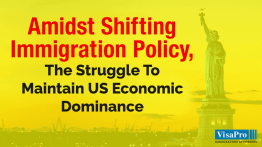Introduction
Trump’s recent declaration of a national state of emergency in an effort to build a Southern border wall is the culmination of his increasingly hostile agenda and tone targeting immigrants in the United States. While this difference is often chalked up to a matter of political opinion, it is important to consider the lasting impacts that the normalization of this rhetoric has on the cultural composition of American social and professional spaces. Once known as the melting pot of the world, the rise of jingoistic values as an accepted form of political expression exacerbated by the Trump presidency has undoubtedly harmed the reputation of the United States as a safe space for persons of all races and ethnicities to flourish.
The Effect of Anti-Immigrant Rhetoric
The current administration’s discourse and policy toward immigrants is the beginning of a troubling trend in the United States. The country relies on a strong and diverse pool of workers and students from within the United States as well as from the international community, and reducing this pool hurts the overall job market. On a more abstract level, it acts to tear down the culture of tolerance that the country as founded upon. According to the 2018 Survey of College and University Directors (commissioned by Inside Higher Ed) claimed that as of August 2018, only 4/10 admissions directors reported meeting international student goals for the academic year, and 6 out of 10 were concerned about maintaining international student admission rates. Perhaps most shockingly of all was the 74% majority that agreed that Trump’s strong nationalist rhetoric played a role in their difficulty reaching out to international students.
Domestic Effects of Decreased International Enrollment
Students are opting to travel outside of the United States in larger numbers than ever, and the lack of diversity only hurts the internal college communities and the experience of domestic students. Top notch students looking to study abroad are looking at fresh locations in high numbers. The abilities that these talented students bring to the table is a major missed opportunity for American universities, which translates to a missed opportunity in the postsecondary education and eventually, the American job mark.

A Continuing Problem
This trend has been exacerbated by a number of policies with an anti-immigrant sentiment, including the proposition of term limits on US student visas. The proposed limits, which will not go into effect until a lengthy period of review, would replace the current policy which allows for students to stay in the United States until their period of study is complete. Perhaps most shocking are the proposed changes to Chinese student and research visas. According to the Associated Press, the proposed changes would affect academics in select fields of study, including robotics, aviation and high -tech manufacturing. The reported changes would not grant Chinese students and researchers the automatic five year term in the United States; instead, terms limits on student visas would be decided on a case by case basis and could be reduced at the discretion of consular officials.
It is important to note that international student enrollment is not on a downward trend; rather, the steadily increasing numbers which have been climbing for 12 consecutive years (according to the Open Doors Report on International Educational Exchange from the Institute of International Education) have seen the lowest margin of increase since 2005/ 2006 academic year. Even these marginal increases are somewhat inflated by increased participation in Optional Training Programs, which allows international students to remain in the United states for up to 12 months (or 36 for STEM field students) to gain practical, on the job experience before returning home. General enrollment and commencement numbers are lower than ever, and aggressive stances like the implementation of a Southern border wall only stands to increase tensions and discourage talented students from entering American Universities.
The Global Context
This issue in attracting students from the international community is indicative of a broader global trend, in which students opt out of traditional American study abroad universities for emerging programs in different countries. According to a 2018 survey of American higher education institutions by the Institute of International Education, 83% of educators cited visa application processes or visa delays as a factor contributing to the decline in international enrollment. Another 60% cited the social and political environment in the United States as a significant contributor to students’ decision to look elsewhere, and 50% attributed it to the students desire to study in another country’s institutions.
Summary
The tense social and political climate in the United States is doubtless a strong contributing factor to troubling international student enrollment trends. Increasingly nationalistic rhetoric around immigration validated by proposed policy changes in the current administration have an impact on the viability of American Universities in competition with the international higher education community, a shortcoming which only serves to negatively affect the academic and social culture as well as the economy in a negative manner.
What VisaPro Customers Are Saying
[VisaPro legal team] was incredibly knowledgable and extremely helpful throughout the process. We were exceptionally impressed with how they have combined the great personal and communication skills they bring and also technology with a highly intuitive website which guides you and keeps you updated throughout the process……..This is a true testimonial, I would highly recommend VisaPro to anyone looking for guidance and success in this area."
 Paul Lyons, President, Atlas Intelligence Inc
Paul Lyons, President, Atlas Intelligence Inc



